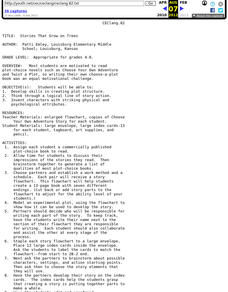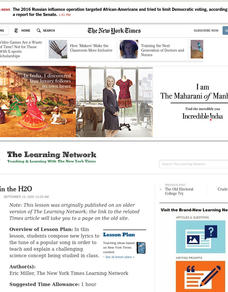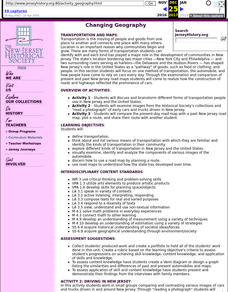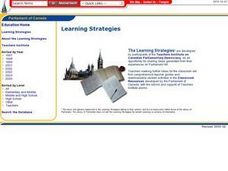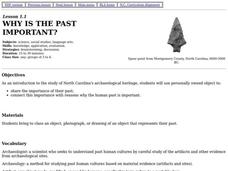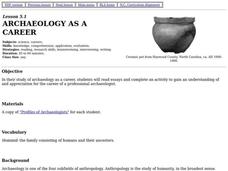Curated OER
Dramatic Feelings (any)
Students examine a feeling word and represent it in a dramatic presentation. Through this, students present and observe the different situations that different feelings can exist in.
Curated OER
Dramatic Feelings
Young scholars examine a feeling word and represent it in a dramatic presentation. Through this, students present and observe the different situations that different feelings can exist in.
Curated OER
Stories That Grow on Trees
Students write their own choose-a-plot book. They develop skills in creating plot structure and think through a logical line of story action. They invent characters with striking physical and psychological attributes.
Curated OER
Singing in the H2O
Young scholars compose new lyrics to the tune of a popular song in order to teach and explain a challenging science concept being studied in class.
Curated OER
Changing Geography
Students visually examine, identify and analyze the components of various images of the automobile. They discern how to use a road map by planning a route, then use road maps to explain how the state has developed over time.
Curated OER
A Union Soldier's View of the Battle of Raymond
Students use a primary resource to collect information about a Civil War battle. They identify similarities and differences between historical wars and modern wars.
Curated OER
Stories That Grow on Trees
Students create their own plot-choice story after reading and discussing a commercially published plot-choice book.
Curated OER
Fortunately, An Analogy
First graders produce a writing based on the story, "Fortunately,". They publish it as a slide show.
Curated OER
Lesson Plan 2--3000 B.C. to 2000 A.D.?
Students, in groups, study the different writing systems from 3000 B.C. to 2000 A.D.
Curated OER
Don't Throw Away That Junk Mail!
Fourth graders study junk mail to learn the techniques that advertisers use to attract and hold a person's attention.
Curated OER
Do a Ditty
Fourth graders work in cooperative groups to create a ditty to teach the characteristics that distinguish literary forms to younger students. The ditty is performed before the class.
Curated OER
Down by the Bay
Students listen to teacher read books about fish and participate in activities in order to explore how to identify bluefish. They count and graph the numbers of fish they find in simulated fishing activities.
Curated OER
Traveling to Japan: Which Way Do We Go?
Fourth graders explore the different types of ways to measure the distance between Florida and Japan.
Curated OER
Va Va Va Zoooommm
Students, in groups, measure a variety of physical components to several activities. They use both standard and non-standard forms of measurement and then develop conclusions about the use of units in measurement.
Curated OER
Something Fishy
Students identify and discuss the adaptive characteristics and behaviors of fish. They view slides of fish, and design and create a model of a fish of the future, listing the ways their fish adapt to survive.
Curated OER
Collecting Data and Graphing
Eighth graders, in groups, count the different colors of M&M's in each kind of package and then draw a pictograph to show the results. Each group writes a program to show their results and then compare the manually-drawn and computer...
Curated OER
Equal Shares for Each Province
Students investigate fairness, equality, and representation in the Canadian Parliament. The concepts are explored within the context of equal distribution of boxes of cereal to various groups.
Curated OER
Media Scrapbook
Students analyze the fundamental issues relating to Canadian parliamentary democracy through the exploration of media and public opinion. A scrapbook is created containing summaries of the work performed.
Curated OER
Introduction to the Democratic Process
Students, in groups, discuss the structure and the function of the Canadian Parliament. They create a poster and present it to the class.
Curated OER
Rebellion, Resolution, Empowerment; Embracing the Challenge to Make a Difference, Past and Present
Learners study the social, economic, and political environment in Canada before 1837.
Curated OER
Citizens' Power : Deliberative Assemblies
Students study the rule that govern the operations of deliberative assemblies. They explore how they can become respectful citizens who explain Parliamentary government.
Curated OER
Government Websites
Learners search for government sites and create master lists by category. They list Executive, Judicial, Legislative and Special Interest Group sites.
Curated OER
Why is the Past Important?
Fourth graders discuss the importance of North Carolina's archaeological heritage. They share with the class an object, photograph, or drawing of an object that represents their own or their family's past.
Curated OER
Archaeology as a Career
Fourth graders read about archaeology as a career. They develop a list of questions they would like to ask an archaeologist and then actually interview an archaeologist on the future of archaeology as a career.


